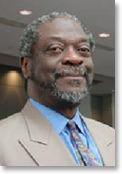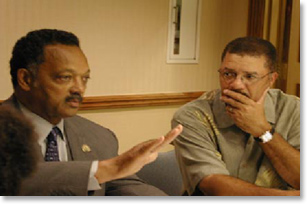
WASHINGTON (FinalCall.com) – They fancy themselves as heirs to the legacy of William Monroe Trotter, who confronted President Woodrow Wilson in the White House on Nov. 12, 1914 concerning segregation and lynching which was flaring up all over the United States.
Segregation is not humiliating, but a benefit,” the President replied. Besides, Pres. Wilson said before the two men engaged in a 45-minute argument, “your manner offends me.”
Mr. Trotter, the first Black Phi Beta Kappa graduate of Harvard University was unmoved. “Two years ago, you were regarded as a second Abraham Lincoln,” he told Mr. Wilson. “Now, we colored leaders (who supported Wilson’s election) are denounced in the colored churches as traitors to our race.”
Today, they are “The Trotter Group,” nearly three dozen Black columnists and commentators whose opinions appear regularly in the nation’s newspapers and broadcast outlets, and they are no traitors to their race.

Black journalists must do more than ever before, insists Trotter Group member and New York City’s Newsday columnist Les Payne. “You want to challenge the assumptions, which are the assumptions they make about your community,” Mr. Payne told The Final Call Aug. 5 during the Unity-Journalists of Color conference in Washington.
“You want to challenge the assumptions they make about Black people, Brown people. You want to challenge the assumptions they make about Muslims, for instance, which is a very big problem in Brooklyn.”
The challenge is insoluble, said Mr. Payne, “until and unless you figure out a way to operate on a dual track. It is as old as what the Harlem Renaissance faced. James Weldon Johnson talked about ‘the dual audience.’ He says when you write as a Black person–or Negro in that time–you’ve got a dual audience.
“On the one hand, you want to talk to Black people. On the other hand, you want to talk to White folks. So if you offend one, you soothe the other. If you soothe one, you offend the other.
“That’s the kind of duality, and the conflict of those two opposing realities is something that the Black journalist faces, and it’s hard for them to figure out,” he continued.
For 12 years, Trotter Group members have been figuring out that conundrum. The group has met and interviewed Pres. Bill Clinton twice; Vice President and 2000 Democratic Party Presidential nominee Al Gore; Secretaries of State Madeline Albright and Colin Powell; National Security Adviser Condoleezza Rice; former Zambian President Kenneth Kaunda; and has sent its members on fact-finding missions to Cuba and Grenada.
When William Monroe Trotter confronted Pres. Wilson, the incident was reported on the front page of The New York Times. Corporate media outlets characterized Mr. Trotter as a poor representative of Black people, possessing “super-abundant, untactful belligerency.” Black leaders also publicly criticized Mr. Trotter’s judgment at that time.
(Ironically, the Unity-Journalists of Color conference this year was challenged by reporter David Carr in the Aug. 9 edition of The New York Times for keeping its membership “based solely on ethnicity,” while not permitting the National Lesbian and Gay Journalists Association into the “Unity” alliance. The homosexual group was permitted, however, to host a recruitment booth, a reception and some social events at the conference.)
The Trotter Group was formed after USA Today columnist DeWayne Wickham, Mr. Payne and Boston Globe columnist
Derrick Jackson came together to share their common experiences and probe issues related to their craft during the 1992 presidential campaign.
“The Negro leader of today is not free,” Mr. Wickham wrote then, quoting the words of H.L. Mencken, in a letter to more than 40 Black columnists inviting them to join. “He must look to White men for his very existence, and in consequence he has to waste a lot of his energy trying to think White. What the Negroes need is leaders who can and will think Black.”
Trotter Group members swim against the prevailing tide toward “career-ism”–the push for better and higher paying jobs–especially among younger journalists and students.
“The cynic among us would say that the younger journalists don’t understand,” explained Mr. Payne. “That they only want to work on one track. They simply want the job. ‘Will do anything for the job.’ Once getting in the job, will say whatever the system wants them to say.
“I think that they have to war against that. And the reason why they have to war against that is because authenticity demands it. Because you cannot live that lie without out really betraying everything that came before you… the people who got you the job.”
William Monroe Trotter was founder of the militant newspaper The Guardian, which was an overnight success; helped organize the Boston Literary and Historical Association; and in 1909 joined with Dr. W.E.B. DuBois and others founding the NAACP.
“Even before the 1975 establishment of NABJ, going back to (Freedom’s Journal founder John) Russwurm and going back to Frederick Douglass and those who wanted to tell our story, I think that still needs to be done in 2004. I really, truly believe that the problem of the 21st Century is the same as it was in the 20th Century, and it’s a matter of color,” NABJ co-founder and Philadelphia Inquirer editor Acel Moore told The Final Call.
“I think (Dr. W.E.B.) DuBois was an amazing prophet. He’s correct and everything that happens proves him to be correct. Everything I saw today at this meeting–the interviews with the Presidential candidates, and what they did and did not say–I think is indicative of: we still have to overcome that (color) problem,” said Mr. Moore.
Outspoken columns and commentaries by Trotter Group members appearing regularly throughout the county now prove one thing, according to Mr. Wickham, “the craft of journalism has a cadre of Black columnists ‘who can and will think Black.’”












